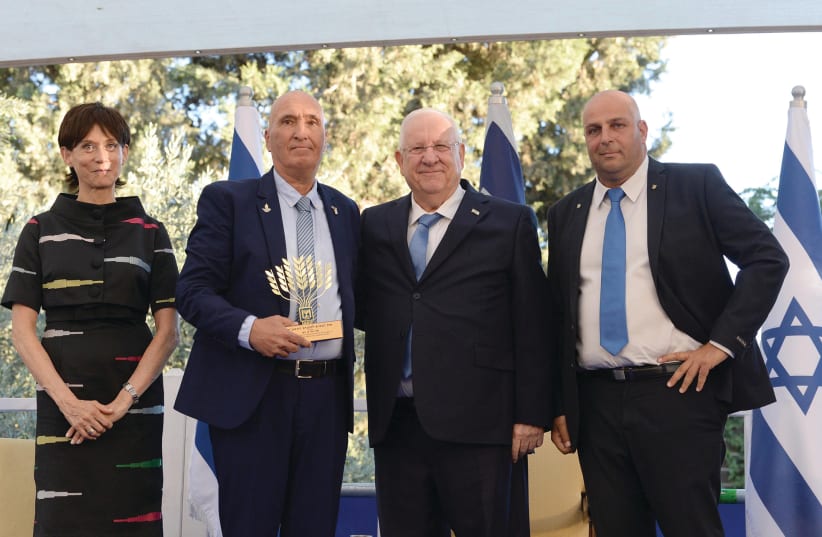Prior to concluding his tenure on Wednesday, when a bust of his likeness will join the row of those of previous presidents at the entrance to the gardens in the presidential complex, President Reuven Rivlin on Sunday hosted two events that are close to his heart.
In the morning he hosted the 47th annual awards of the President’s Prize for Volunteerism, and in the late afternoon, he hosted the Bible Circle which has been meeting at regular intervals throughout the seven years in which he has been in office.
The main hall in the President’s Residence was packed to overflowing with prize winners, their families and fellow volunteers of the projects represented by the awardees.
As Rivlin entered the hall, there was a loud and spontaneous ovation, and scores of people held up their cell phones in order to capture the president in their cameras.
Dr. Baruch Levy, president of the Israel Council on Volunteerism, remarked that there was no better way to start the week than in the presence of so many volunteers representing so many different areas of volunteerism. Levy characterized volunteerism as the backbone of society, and the best example of the beauty of any country.
FORMER IDF chief of staff Gadi Eisenkot, who chaired the advisory committee of adjudicators that examined hundreds of nominations before deciding on the 12 awardees, commented that the corona crisis in all its areas of impact posed more challenges than ever for Israel’s volunteers, who worked with devotion and determination to give hope and sustenance to those who were affected physically, economically, psychologically and otherwise.
He was particularly gratified that award recipients encompassed Jews, (including members of the Ethiopian community), Arabs and Druze of different streams of faith and political persuasions who individually and collectively contribute to Israel’s resilience.
In this respect, Eisenkot hinted at Rivlin going beyond the call of duty. “When I was chief of staff,” he said, “I witnessed President Rivlin’s genuine concern for the welfare of soldiers and their families.” Then, directly addressing the president, he said: “I salute you.”
Rivlin declared that he had always been proud to host this particular event because it is so representative of mutual respect and social solidarity. He was even prouder this time, because all those present had unstintingly given of themselves during the coronavirus pandemic.
“You represent the beautiful Israel, in that each gives of themselves for the other, because we are responsible for each other.” said Rivlin.
Despite their social differences, he observed, volunteers are the various parts that together make a united body that is capable of turning every challenge into an opportunity, and is building connecting bridges.
Rivlin was almost emotional as he praised those who in the most humane fashion and at risk of their own safety brought food and medicine to the sick and the needy.
What they all had in common, he said, was that they saw what they were doing as a mission aimed at the betterment of society.
On a concluding note, Rivlin said he was happy to be rejoining ordinary society. The statement elicited a long, loud, standing and cheering ovation.
THIS YEAR’S twelve awards went to:
Odelia Fitoussi, 42, who is wheelchair-bound and last November was elected to sit on the UN Committee on the Rights of Persons with Disabilities, and who has long fought for such rights in Israel.
Erez Perlmutter, 55, a high tech and management expert, who established a website that helps people to know their rights and how to fight for them.
Hazima Maher, 39, a Druze social activist from Kfar Magar, who is chairman of the Rav Kiyum (Mega Sustainability) association and works toward strengthening the connection between the diverse sectors of society.
Miriam Indig, a 94-year-old Jerusalemite and Holocaust survivor who migrated from Romania in 1959, and volunteers in several organizations – including educational and agricultural projects for farmers and youth, and Melabev, which provides various services for senior citizens who are experiencing various stages of dementia. She lost her son Dov in the Yom Kippur War and has created many initiatives in his memory.
Orna Shimoni, 80, a member of Kibbutz Ashdod Yazakov Meuhad and a widow with five children, 15 grandchildren and two great-grandchildren, who created a flower garden called the Hill of Picked Flowers in Naharayim where seven Israeli school girls were shot and killed by a Jordanian sniper. In memory of one of her sons who was killed in Lebanon, she also created Beit Eyal, an organization to help people with disabilities, as well as founding the Center for the Memory of IDF soldiers and victims of terrorism in the Lebanon War.
Dr. Tamara Kolitz, founder of Lema’anam (For Their Sake) – Physicians for Holocaust Survivors, which examines and treats Holocaust survivors in their homes free of charge.
The Ashuja’an Association for Arab children with Juvenile Diabetes – believed to be the first of its kind in Israel’s Arab society.
The Hoshen Education and Change organization, which works for equality, inclusion and security for the LGBT community through meetings, discussions, explanations and education.
The Teneh Briyut (Health Basket) organization, which works to promote health, education and rights among members of Israel’s Ethiopian communities.
Yedidim – the Friends association, which provides 24/7 non-medical aid on the road, gratis.
The Kulana Yerushalayim association, which brings together Jewish and Arab residents of east and west Jerusalem on a variety of platforms to emphasize what unites them rather than what divides them
Refuah v’Simchah – the Healing and Joy Association, which provides free help and support to people with disabilities and their families, including transporting them to and from hospitals or surgery.
